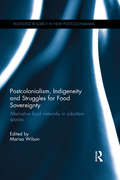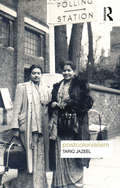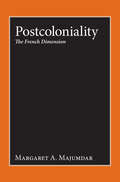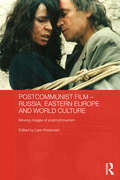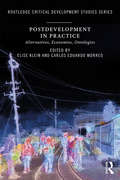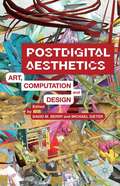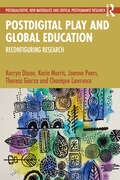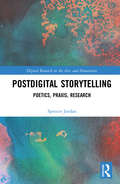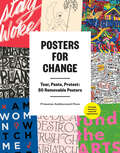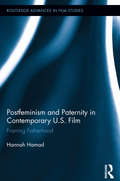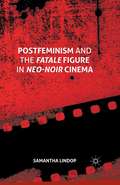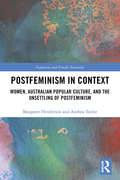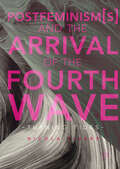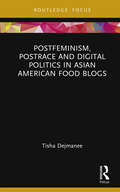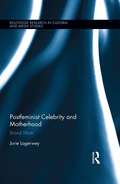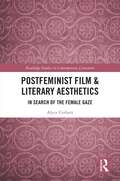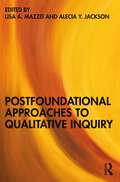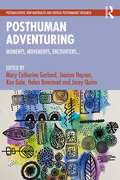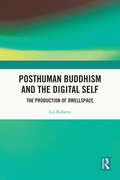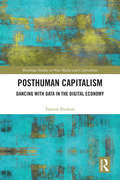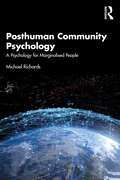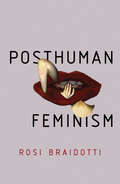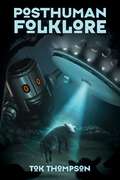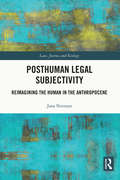- Table View
- List View
Postcolonialism, Indigeneity and Struggles for Food Sovereignty: Alternative food networks in subaltern spaces (Routledge Research in New Postcolonialisms)
by Marisa WilsonThis book explores connections between activist debates about food sovereignty and academic debates about alternative food networks. The ethnographic case studies demonstrate how divergent histories and geographies of people-in-place open up or close off possibilities for alternative/sovereign food spaces, illustrating the globally uneven and varied development of industrial capitalist food networks and of everyday forms of subversion and accommodation. How, for example, do relations between alternative food networks and mainstream industrial capitalist food networks differ in places with contrasting histories of land appropriation, trade, governance and consumer identities to those in Europe and non-indigenous spaces of New Zealand or the United States? How do indigenous populations negotiate between maintaining a sense of moral connectedness to their agri- and acqua-cultural landscapes and subverting, or indeed appropriating, industrial capitalist approaches to food? By delving into the histories, geographies and everyday worlds of (post)colonial peoples, the book shows how colonial power relations of the past and present create more opportunities for some alternative producer–consumer and state–market–civil society relations than others.
Postcolonialism: Nature, Environment And The Postcolonial Geographies Of Sri Lankan Nationhood (Key Ideas in Geography #12)
by Tariq JazeelPostcolonialism is a book that examines the influence of postcolonial theory in critical geographical thought and scholarship. Aimed at advanced-level students and researchers, the book is a lively, stimulating and relevant introduction to ‘postcolonial geography’ that elaborates on the critical interventions in social, cultural and political life this important subfield is poised to make. The book is structured around three intersecting parts – Spaces, 'Identity'/hybridity, Knowledge – that broadly follow the trajectory of postcolonial studies since the late 1970s. It comprises ten main chapters, each of which is situated at the intersections of postcolonialism and critical human geography. In doing so, Postcolonialism develops three key arguments. First, that postcolonialism is best conceived as an intellectually creative and practical set of methodologies or approaches for critically engaging existing manifestations of power and exclusion in everyday life and in taken-as-given spaces. Second, that postcolonialism is, at its core, concerned with the politics of representation, both in terms of how people and space are represented, but also the politics surrounding who is able to represent themselves and on what/whose terms. Third, the book argues that postcolonialism itself is an inherently geographical intellectual enterprise, despite its origins in literary theory. In developing these arguments and addressing a series of relevant and international case studies and examples throughout, Postcolonialism not only demonstrates the importance of postcolonial theory to the contemporary critical geographical imagination. It also argues that geographers have much to offer to continued theorizations and workings of postcolonial theory, politics and intellectual debates going forward. This is a book that brings critical analyses of the continued and omnipresent legacies of colonialism and imperialism to the heart of human geography, but also one that returns an avowedly critical geographical disposition to the core of interdisciplinary postcolonial studies.
Postcoloniality: The French Dimension
by Margaret A. Majumdar“Postcolonial theory” has become one of the key issues of scholarly debates worldwide; debates, so the author argues, which have become rather sterile and are characterized by a repetitive reworking of old hackneyed issues, focussing on cultural questions of language and identity in particular. Gradually, a gulf has emerged between Anglophone and Francophone thinking in this area. The author investigates the causes for the apparent stagnation that has overtaken much of the current debate and explores the particular characteristics of French global strategy and cultural policy, as well as the divergent responses to current debates on globalization. Outlining in particular the contribution of thinkers such as Césaire, Senghor, Memmi, Sartre and Fanon to the worldwide development of anti-imperialist ideas, she offers a critical perspective on the ongoing difficulties of France’s relationship with its colonial and postcolonial Others and suggests new lines of thought that are currently emerging in the Francophone world, which may have the capacity to take these debates.
Postcommunist Film - Russia, Eastern Europe and World Culture: Moving Images of Postcommunism (Routledge Contemporary Russia and Eastern Europe Series)
by Lars KristensenA post-communist condition has arisen from the fall of the Berlin Wall and later the Soviet Empire: this book looks at how this condition has manifested itself globally in the production of post-communist film. It argues post-communism is a shared experience on a geopolitical level, unlimited by national state borders, and examines post-communist cross culturalism and global totalitarianism within film. The book examines different national cinemas and dissimilar cinematic modes - from Russian blockbuster cinema to Chinese independent cinema; from Serbian city films to revolutionary films of Mozambique - all formulated as within the postcommunist condition. It considers the postcommunist film in terms of transnational and World cinema. It covers a wide range of films from small and independent filmmaking to mainstream, popular cinema, and explains post-communist signifiers as manifested in visual culture both inside and outside former, and current, communist countries.
Postdevelopment in Practice: Alternatives, Economies, Ontologies (Routledge Critical Development Studies)
by Elise Klein Carlos Eduardo MorreoPostdevelopment in Practice critically engages with recent trends in postdevelopment and critical development studies that have destabilised the concept of development, challenging its assumptions and exposing areas where it has failed in its objectives, whilst also pushing beyond theory to uncover alternatives in practice. This book reflects a rich and diverse range of experience in postdevelopment work, bringing together emerging and established contributors from across Latin America, South Asia, Europe, Australia and elsewhere, and it brings to light the multiple and innovative examples of postdevelopment practice already underway. The complexity of postdevelopment alternatives are revealed throughout the chapters, encompassing research on economy and care, art and design, pluriversality and buen vivir, the state and social movements, among others. Drawing on feminisms and political economy, postcolonial theory and critical design studies, the ‘diverse economies’ and ‘world of the third’ approaches and discussions on ontology and interdisciplinary fields such as science and technology studies, the chapters reveal how the practice of postdevelopment is already being carried out by actors in and out of development. Students, scholars and practitioners in critical development studies and those seeking to engage with postdevelopment will find this book an important guide to applying theory to practice.
Postdigital Aesthetics
by David M. Berry Michael DieterPostdigital Aesthetics presents a constellation of contributors who seek to unpack, explore and critically reflect on the questions raised by the notion of the postdigital and its relation to our computational everyday lives. Through a number of interventions, each chapter subjects the concept and ideas that surround our ideas of an aesthetic of the postdigital to critical examination to understand the new asterism of material digital culture in the twenty-first century. From Minecraft to post-internet art, each contributor offers an original perspective on network culture and its distinctive aesthetics and politics, and the relations between art, computation and design.
Postdigital Play and Global Education: Reconfiguring Research (Postqualitative, New Materialist and Critical Posthumanist Research)
by Kerryn Dixon Karin Murris Joanne Peers Theresa Giorza Chanique LawrencePostdigital Play and Global Education: Reconfiguring Research is a re-turn to a large-scale, international project on children’s digital play. Adopting postqualitative and posthumanist theories, research practices are reconfigured all the way down from what counts as ‘data’, ‘tools’, ‘instruments’, ‘transcription’, research sites’, ‘researchers’, to notions of responsibility and accountability in qualitative research. Through a series of vignettes involving complex human and more-than-human collaborators (e.g., GoPros, octopus, avatars, diaries, sackball, LEGO bricks), the authors challenge who and what can be playful and creative across contexts in the global north and global south. The diffractive methodology enacted interrupts Western developmental notions of agency that are dominant in research involving young children.The concept of ‘postdigital’ offers fresh opportunities to disrupt dominant understandings of children’s play. Play emerges as an enigmatic and shape-shifting human and more-than-human agentic force that operates beyond digital/non-digital, online/ offline binaries. By attuning to race, gender, age and language, invisible and colonising aspects of postdigital worldings the authors show how global education research can be reimagined through a posthumanist decentering of children without erasure.Postdigital Play and Global Education puts into practice Karen Barad’s agential realism, but also a range of postdevelopmental and posthumanist writings from diverse fields. The book will be of particular interest to researchers looking for guidance to enact agential realist and posthumanist philosophies in research involving young children.
Postdigital Storytelling: Poetics, Praxis, Research (Digital Research in the Arts and Humanities)
by Spencer JordanPostdigital Storytelling offers a groundbreaking re-evaluation of one of the most dynamic and innovative areas of creativity today: digital storytelling. Central to this reassessment is the emergence of metamodernism as our dominant cultural condition. This volume argues that metamodernism has brought with it a new kind of creative modality in which the divide between the digital and non-digital is no longer binary and oppositional. Jordan explores the emerging poetics of this inherently transmedial and hybridic postdigital condition through a detailed analysis of hypertextual, locative mobile and collaborative storytelling. With a focus on twenty-first century storytelling, including print-based and nondigital art forms, the book ultimately widens our understanding of the modes and forms of metamodernist creativity. Postdigital Storytelling is of value to anyone engaged in creative writing within the arts and humanities. This includes scholars, students and practitioners of both physical and digital texts as well as those engaged in interdisciplinary practice-based research in which storytelling remains a primary approach.
Posters for Change: Tear, Paste, Protest
by Princeton Press"Posters for Change is the kind of project that the world needs right now." – Shepard FaireyMake your voice heard with this collection of 50 tear-out posters created by designers from around the globe! This collection of posters is made for—and by—people who want to make their voices heard in a time of unprecedented political activism and resistance. Stand up for:• Animal Rights• Child Labor• Civil Rights• Climate Change and the Environment• Gun Control• Health Care Access• Immigration• LGBTQ and Gender Rights• Mass Incarceration• Public Arts• Voting Rights• Women's RightsProceeds will be donated to the following nonprofit organizations: Advocates for Human Rights, Border Angels, Honor the Earth, and the Sylvia Rivera Law Project. A foreword by Avram Finkelstein, a designer for the AIDS art activist collective Gran Fury, looks at the crucial role of graphic activism in the current political climate.
Postfeminism and Paternity in Contemporary US Film: Framing Fatherhood (Routledge Advances in Film Studies)
by Hannah HamadThis book interrogates representations of fatherhood across the spectrum of popular U.S. film of the early twenty-first century. It situates them in relation to postfeminist discourse, identifying and discussing dominant paradigms and tropes that emerge from the tendency of popular cinema to configure ideal masculinity in paternal terms. It analyses postfeminist fatherhood across a range of genres including historical epics, war films, westerns, bromantic comedies, male melodramas, action films, family comedies, and others. It also explores recurring themes and intersections such as the rejuvenation of aging masculinities through fatherhood, the paternalized recuperation of immature adult masculinities, the relationship between fatherhood in film and 9/11 culture, post-racial discourse in representations of fatherhood, and historically located formations of fatherhood. It is the first book length study to explore the relationship between fatherhood and postfeminism in popular cinema.
Postfeminism and the Fatale Figure in Neo-Noir Cinema
by Samantha LindopThis book is a thought-provoking study that expands on film scholarship on noir and feminist scholarship on postfeminism, subjectivity, and representation to provide an inclusive, sophisticated, and up-to-date analysis of the femme fatale , fille fatale , and homme fatal from the classic era through to recent postmillennial neo-noir .
Postfeminism in Context: Women, Australian Popular Culture, and the Unsettling of Postfeminism (Feminism and Female Sexuality)
by Anthea Taylor Margaret HendersonPostfeminism in Context studies the representation of women in Australian popular culture over the past three decades to locate postfeminism in a specific time and place. Margaret Henderson and Anthea Taylor argue that ‘postfeminism’, as a critical term, has been too often deployed in ways that fail to account for historical and cultural specificity. This book analyses Australian popular culture – chick lit novels; ‘dramedy’ television shows; women’s magazines; YouTube vlogs; self-help manuals; and newspapers – to reveal the tensions, contradictions and ambiguities that have always been constitutive of postfeminism, including in Australia. Examining how these popular forms intervene in dominant conversations about contemporary Australian womanhood, Postfeminism in Context maps the ways in which various aspects of Australia’s history and national identity have shaped its postfeminism. While Henderson and Taylor identify some of the limited postfeminist tropes and patterns of representation evident in comparable locales, they also find that Australian popular culture has responded to feminism in a much more hopeful way. Adding some much needed cultural specificity to the ongoing debate around this loaded term, Postfeminism in Context is essential reading for those interested in Australian popular culture, feminism, and the gendered politics of representation.
Postfeminism(s) and the Arrival of the Fourth Wave: Turning Tides
by Nicola RiversThis book addresses the current resurgence of interest in feminism–notably within popular culture and media–that has led some to announce the arrival of the fourth wave. Research explores where fourth-wave feminism sits in relation to those that preceded it, and in particular, how fourth-wave feminism intersects with differing understandings of postfeminism(s). Through accessible and highly topical examples such as; the controversial actions of activist group, Femen; the rising phenomenon of ‘celebrity feminism;’ or the assumed outdated views of feminists’ associated with previous waves, the relationship between differing concepts of postfeminism(s) is illustrated. By pressing the need for an intergenerational approach to fourth-wave feminism, this book encourages engaging past debates and theorists allowing readers with an interest in the relationship between feminism and popular culture a fuller understanding of feminist theory and providing the opportunity to take stock before diving headfirst into another wave.
Postfeminism, Postrace and Digital Politics in Asian American Food Blogs (Focus on Global Gender and Sexuality)
by Tisha DejmaneeThis book examines how Asian American women bloggers challenge dominant race and gender discourses through the practice of food blogging. Asian American food blogs, which situate recipes and food photography within the personal narratives and domestic spaces of Asian American women, offer unique insights into the ways that hegemonic race and gender discourses are negotiated in quotidian life. The genre’s focus on food provides a particularly rich backdrop for this study as it necessarily implicates family histories, gendered labour, domestic spaces, and the power dynamics of consumption. These intimate digital texts therefore provide unique insights into the ways that postfeminist and postrace discourses are encountered in the individual’s mundane experiences. The author engages a critical cultural analysis of food blogs narratives, images, communities, and platforms expressions of post-race and feminism discourses are constrained by the commercial logics of this digital culture. The author argues that while Asian American food blogs rarely present a sustained challenge to hegemonic identity representation, the processes of reproduction and rupture that define this blogosphere consistently reveal the collective desire to push back against the limits of ‘post’-identities. This is a unique and fascinating study which is ideal reading for students and scholars of gender studies, media studies, cultural studies and sociology.
Postfeminist Celebrity and Motherhood: Brand Mom (Routledge Research in Cultural and Media Studies)
by Jorie LagerweyThis book analyzes the intersections of celebrity, self-branding, and "mommy" culture. It examines how images of celebrity moms playing versions of themselves on reality television, social media, gossip sites, and self-branded retail outlets negotiate the complex demands of postfeminism and the current fashion for heroic, labor intensive parenting. The cultural regime of "new momism" insists that women be expert in both affective and economic labor, producing loving families, self-brands based on emotional connections with consumers, and lucrative saleable commodities. Successfully creating all three: a self-brand, a style of motherhood, and lucrative product sales, is represented as the only path to fulfilled adult womanhood and citizenship. The book interrogates the classed and racialized privilege inherent in those success stories and looks for ways that the versions of branded motherhood represented as failures might open a space for a more inclusive emergent feminism.
Postfeminist Film & Literary Aesthetics: In Search of the Female Gaze (Routledge Studies in Contemporary Literature)
by Alyce CorbettPostfeminist Film & Literary Aesthetics: In Search of the Female Gaze represents a novel and comprehensive study of the aesthetic and affective textual innovations of women in the 21st century from a postfeminist perspective. This book both defines and helps shape the contours of four fast-growing critically and commercially popular modes—millennial film and fiction, metamodernism, an anti-narrative and decorative realm named here as ‘still life’, and new cli-fi—in which there is no clear male equivalent or in which women’s work can be read as a distinct aesthetic force. As the textual constellation of now is being mapped and its key texts being canonised, this book contributes to the current recentring of aesthetic taste that is occurring in literature, film, and surrounding criticism, making greater space for the appreciation of female aesthetics and for future inquiries in this field.
Postfoundational Approaches to Qualitative Inquiry
by Alecia Y. Jackson Lisa A. MazzeiPostfoundational Approaches to Qualitative Inquiry is an edited collection that aims to move beyond a critique and deconstruction of method in order to present an engagement with various postfoundational frameworks and approaches that produce new concepts and enactments. What makes this book innovative is the singular focus on postfoundational paradigms, borrowed from the humanities and sciences, that are enveloped in what is referred to as the ontological turn, the new empiricisms, and the new materialisms. Postfoundational inquiry is conceived by the editors as emergent, relational, responsive, involuntary, and inventive. While the editors name the facets of these contingent approaches and explain how they work, they do so not in order to fix a new method, but to spur new connectives. In this collection, authors take up a range of postfoundational theories such as poststructuralism, posthumanism, postcolonialism, feminist new materialism, speculative/ new empiricism, agential realism, immanent ontologies, and affect theory. Provoked by a series of reorienting questions, chapters in the book offer enactments as a way of unfurling what is unthought, not yet, and becoming. The chapters are organized according to four Openings: Atmospheres, Affects, and Hauntings; Archives, Worldings, and Sketchings; Escaping Tradition, Beginning Elsewhere, and the Politics of Doing Otherwise; Pre-personal Agencies and Thought Taking Flight. This book can be used as a standalone text in advanced qualitative inquiry courses, or as a supplementary text in courses that examine the use of theory in research.
Posthuman Adventuring: Moments, Movements, Encounters... (Postqualitative, New Materialist and Critical Posthumanist Research)
by Joanna Haynes Ken Gale Jocey Quinn Helen Bowstead Mary Catherine GarlandPosthuman Adventuring immerses readers in a transdisciplinary methodology that merges images and sounds to inspire ongoing dialogue and provoke imaginative inquiry. Through a compilation of thought‑provoking chapters, this book connects readers to original presentations by renowned posthuman thinkers and offers responses from various authors.This collection showcases groundbreaking posthuman research conducted by scholars, artists, community‑based practitioners, and doctoral students across diverse contexts, spanning from forced migration to intergenerational relationships, from plants to bears, and from collective writing to reimagining social structures. With its experimental practices and transformative encounters, this unique anthology encourages readers to embark on their own intellectual adventures and cultivate fresh concepts. Emphasizing the fluidity and emergence of ideas, this book features chapters written by individuals and collaborative groups, each opening new spaces of inquiry and experimentation. The range of topics covered is vast, drawing inspiration from unexpected sources such as crochet blankets, women’s football, trauma within Canadian residential schools, sketchbooks, postverbal learning in dementia, and preschool outings in Johannesburg. This book invites readers to speculate, make connections, and invent their own concepts while showcasing the ongoing actualization of ideas.Ideal for scholars of posthumanist thinking across the social sciences.
Posthuman Buddhism and the Digital Self: The Production of Dwellspace
by Les RobertsIn Posthuman Buddhism and the Digital Self, Les Roberts extends his earlier work on spatial anthropology to consider questions of time, spaciousness and the phenomenology of self. Across the book’s four main chapters – which range from David Bowie’s long-standing interest in Buddhism, to street photography of 1980s Liverpool, to the ambient soundscapes of Derek Jarman’s Blue, or to the slow, contemplative cinema of Tsai Ming-Liang – Roberts lays the groundwork for the concept of ‘dwellspace’ as a means by which to unpick the shifting spatial, temporal and experiential modalities of everyday mediascapes. Understood as a particular disposition towards time, Roberts’s foray into dwellspace proceeds from a Pascalian reflection on the self/non-self in which being content in an empty room vies with the demands of having content in an empty room. Taking the idea of posthuman Buddhism as a heuristic lens, Roberts sets in motion a number of interrelated lines of enquiry that prompt renewed focus on questions of boredom, distraction and reverie and cast into sharper relief the psychosocial and creative affordances of ambience, spaciousness and slowness. The book argues that the colonisation of ‘empty time’ by 24/7 digital capitalism has gone hand-in-hand with the growth of the corporate mindfulness industry, and with it, the co-option, commodification and digitisation of dwellspace. Posthuman Buddhism is thus in part an exploration of the dialectics of dwellspace that orbits around a creative self-praxis rooted in the negation and dissolution of the self, one of the foundational cornerstones of Buddhist theory and practice.
Posthuman Capitalism: Dancing with Data in the Digital Economy (Routledge Studies in New Media and Cyberculture)
by Yasmin IbrahimPosthuman Capitalism critically reviews the manifestation of capitalist agenda online by examining the phenomenon of the ‘posthuman’ in the data economy. The chapters examine our posthuman condition, where we are constantly asked to partake in platforms which perform to capitalist agenda while socializing us into new platforms of living, consuming and interacting online. Labelling these modes of our experiential extractions, transactions and re-making of our mortal lives as posthuman capitalism, the book reviews the human entanglements from sociality, friendship, desire, memory, transgressions of privacy and co-production of value through the data economy. Offering innovative and interdisciplinary conceptualisations and vantage points on our contemporary data society, this book will be a key text for scholars and students in the areas of digital media, communication studies, sociology, philosophy and social psychology.
Posthuman Community Psychology: A Psychology for Marginalised People
by Michael RichardsPosthuman Community Psychology is an exploration of mainstream psychology through a critical posthumanity perspective, examining psychology’s place in the world and its relationship with marginalised people, with a focus on people with disabilities. The book argues that the history of modern psychology is underpinned by reductionism and individualism, which is embedded within the contemporary psychology that we know today despite the challenges from critical and community psychologists who seek a more empowering, inclusive, and activist psychology. The posthuman community psychology ideas that emerge in this book examine and intersect with mainstream psychology, critical and community psychologies, critical posthumanities and disability studies to propose an imaginative, reflective, and relational new psychology that represents a collection of possibilities that do not remain entrenched in older ways of thinking about humans and human connections. Richards proposes that psychology has the potential to evolve and make a powerful and profound difference for marginalised people, but a genuine desire for change from psychologists is essential for this to happen. Illustrating the important considerations needed when examining the relationship between the discipline of psychology and marginalised people, this book is fascinating reading for community psychology students and academics, aspiring professional psychologists, community workers, and policy makers.
Posthuman Feminism
by Rosi BraidottiIn a context marked by the virulent return of patriarchal and white supremacist attitudes, a new generation of feminist activists are continuing the struggle: these are very feminist times. But how do these and other movements relate to the contemporary posthuman condition? In this important new book, Rosi Braidotti examines the implications of the posthuman turn for feminist theory and practice. She defines the posthuman turn as a convergence between posthumanism on the one hand and post-anthropocentrism on the other, and she examines their complex relationship and joint impact. Braidotti claims that mainstream posthuman scholarship has neglected feminist theory, while in fact feminism is one of the precursors of the posthuman turn, through diverse social movements and political traditions. Posthuman Feminism is an analytic and creative response to contemporary conditions and a call to action. It highlights the constraints but also the potentialities available to feminist political subjects as they confront the ever-growing injustices of sexism, racism, ecocide and neoliberal capitalism. This bold new text by a leading feminist philosopher will be of great interest to students and scholars throughout the humanities and social sciences.
Posthuman Folklore
by Tok ThompsonCan a monkey own a selfie? Can a chimp use habeas corpus to sue for freedom? Can androids be citizens? Increasingly, such difficult questions have moved from the realm of science fiction into the realm of everyday life, and scholars and laypeople alike are struggling to find ways to grasp new notions of personhood. Posthuman Folklore is the first work of its kind: both an overview of posthumanism as it applies to folklore studies and an investigation of “vernacular posthumanisms”—the ways in which people are increasingly performing the posthuman. Posthumanism calls for a close investigation of what is meant by the term “human” and a rethinking of this, our most basic ontological category. What, exactly, is human? What, exactly, am I? There are two main threads of posthumanism: the first dealing with the increasingly slippery slope between “human” and “animal,” and the second dealing with artificial intelligences and the growing cyborg quality of human culture. This work deals with both these threads, seeking to understand the cultural roles of this shifting notion of “human” by centering its investigation into the performances of everyday life.From funerals for AIBOs, to furries, to ghost stories told by Alexa, people are increasingly engaging with the posthuman in myriad everyday practices, setting the stage for a wholesale rethinking of our humanity. In Posthuman Folklore, author Tok Thompson traces both the philosophies behind these shifts, and the ways in which people increasingly are enacting such ideas to better understand the posthuman experience of contemporary life.
Posthuman Legal Subjectivity: Reimagining the Human in the Anthropocene (Law, Justice and Ecology)
by Jana NormanThis book provides a reimagining of how Western law and legal theory structures the human–earth relationship. As a complement to contemporary efforts to establish rights of nature and non-human legal personhood, this book focuses on the other subject in the human–earth relationship: the human. Critical ecological feminism exposes the dualistic nature of the ideal human legal subject as a key driver in the dynamic of instrumentalism that characterises the human–earth relationship in Western culture. This book draws on conceptual fields associated with the new sciences, including new materialism, posthuman critical theory and Big History, to demonstrate that the naturalised hierarchy of humans over nature in the Western social imaginary is anything but natural. It then sets about constructing a counternarrative. The proposed ‘Cosmic Person’ as alternative, non-dualised human legal subject forges a pathway for transforming the Western cultural understanding of the human–earth relationship from mastery and control to ideal co-habitation. Finally, the book details a case study, highlighting the practical application of the proposed reconceptualisation of the human legal subject to contemporary environmental issues. This original and important analysis of the legal status of the human in the Anthropocene will be of great interest to those working in legal theory, jurisprudence, environmental law and the environmental humanities; as well as those with relevant interests in gender studies, cultural studies, feminist theory, critical theory and philosophy.
Posthuman Research Practices in Education
by Carol A. Taylor Christina HughesHow do we include and develop understandings of those beyond-the-human aspects of the world in social research? Through fifteen contributions from leading international thinkers, this book provides original approaches to posthumanist research practices in education. It responds to questions which consider the effect and reach of posthuman research.
